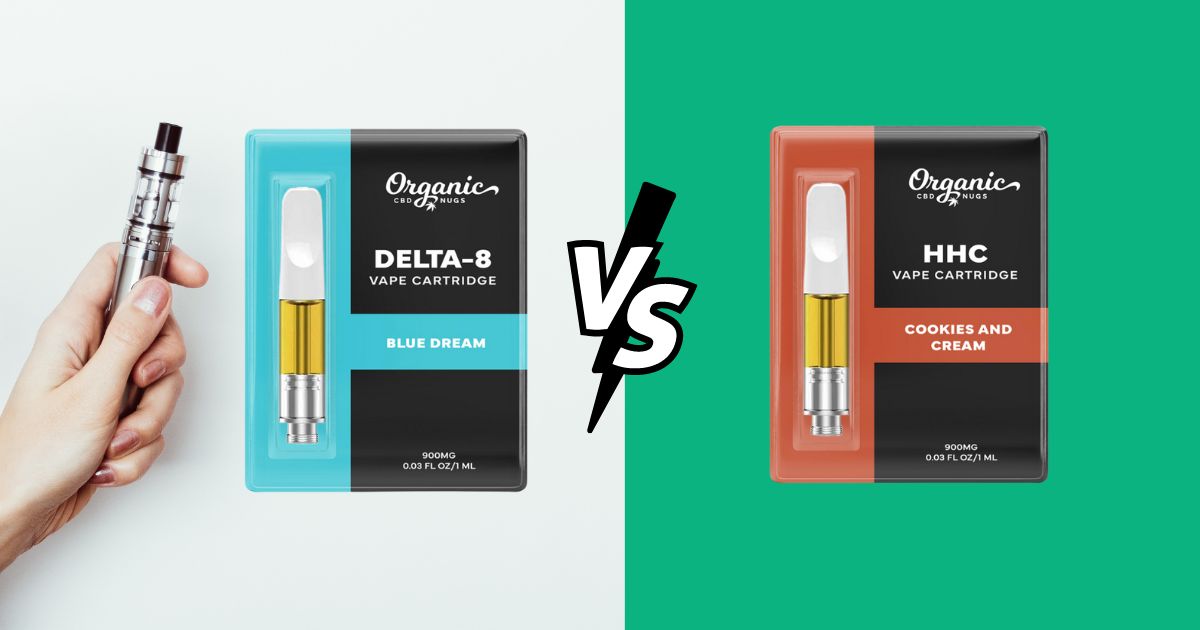

A Comprehensive Guide to HHC vs Delta 8: Understanding the Differences
In recent years, the world of cannabinoids has expanded far beyond the well-known THC and CBD compounds. Two newer players in the cannabinoid world are HHC (tetrahydrocannabinol) and Delta 8 THC. These cannabinoids are rapidly gaining popularity for their unique effects and benefits, especially among those seeking alternatives to traditional THC. But what exactly are HHC and Delta 8, and how do they compare?
In this article, we’ll dive deep into the differences between HHC and Delta 8, explaining their origins, effects, legality, and potential uses. If you’re curious about which one might be right for you, read on to discover everything you need to know!
What Are HHC and Delta 8?
Before we jump into the comparison of HHC vs Delta 8, it’s important to understand what each of these cannabinoids is.
HHC (tetrahydrocannabinol)
HHC, or Hexahydrocannabinol, is a hydrogenated form of THC. It’s naturally found in very small amounts in the cannabis plant but is often synthesized from other cannabinoids like CBD. HHC is relatively new to the market and is often described as offering a milder experience than Delta 9 THC, which is the main psychoactive compound in cannabis.
Because HHC is hydrogenated, it is more stable than other forms of THC, meaning it has a longer shelf life and can withstand heat and light better. Users of HHC often report a feeling of relaxation and euphoria, similar to Delta 9 but with a more subtle effect.
Delta 8 THC
Delta 8 THC is a naturally occurring cannabinoid found in the cannabis plant, but it’s typically present in very small concentrations. Like HHC, Delta 8 is often synthesized from CBD. Delta 8 offers a milder high compared to Delta 9 THC, making it an attractive option for users who want the benefits of THC without the intense psychoactive effects.
Delta 8 THC is known for providing a calming, uplifting effect, which can help with relaxation and stress relief. It’s often used by people who want to enjoy the benefits of THC but are sensitive to the stronger effects of Delta 9.
HHC vs Delta 8: Chemical Differences
When comparing HHC vs Delta 8, the chemical structure is one of the main differences. Both are cannabinoids that interact with the body’s endocannabinoid system, but they have unique molecular structures that affect how they behave.
Chemical Structure of HHC
HHC is similar to THC but with one key difference: it has extra hydrogen atoms attached to its structure. This hydrogenation makes HHC more stable, allowing it to retain its potency over time. It also means that HHC is less susceptible to oxidation, a process that can degrade other forms of THC when exposed to air.
Chemical Structure of Delta 8 THC
Delta 8 THC is an isomer of Delta 9 THC, meaning it has a similar structure but with slight differences in the placement of bonds. These differences make Delta 8 less psychoactive than Delta 9 THC, leading to a more relaxed, clear-headed high.
Both HHC vs Delta 8 interact with the body’s CB1 and CB2 receptors, which are part of the endocannbinoid system. However, due to their molecular differences, the effects and intensity of their interactions vary.
Effects of HHC vs Delta 8
One of the most important factors in deciding between HHC and Delta 8 is how each one affects the body and mind. While both cannabinoids provide a less intense experience compared to Delta 9 THC, their effects are distinct.
HHC Effects
Users of HHC often describe the effects as calming and relaxing, but not overwhelmingly psychoactive. The high is reported to be more mellow than Delta 9 THC, with less paranoia or anxiety. Some users report feeling a sense of euphoria, but the experience is generally more manageable.
Common Effects of HHC:
- Mild euphoria
- Relaxation
- Reduced stress
- Subtle mind and body high
- Less intense than Delta 9 THC
Delta 8 Effects
Delta 8 THC is also known for providing a milder high, but its effects are often described as more uplifting and energizing compared to HHC. Users report feelings of happiness and calm, without the mental fog or anxiety that can sometimes accompany Delta 9 THC use. Delta 8 tends to offer a clearer, more focused experience.
Common Effects of Delta 8 THC:
- Uplifted mood
- Relaxation
- Enhanced focus and clarity
- Reduced anxiety
- Mild to moderate euphoria
Legality of HHC vs Delta 8
The legality of cannabinoids like HHC vs Delta 8 can vary greatly depending on where you live, so it’s important to understand the legal landscape surrounding these compounds.
HHC Legality
HHC exists in a bit of a legal gray area. Since it’s a relatively new compound, it hasn’t been specifically addressed in any state or federal regulations. Because HHC is derived from hemp (like many other cannabinoids), it is often considered legal under the 2018 Farm Bill, which legalized hemp-derived products containing less than 0.3% Delta 9 THC. However, because it’s chemically altered, some states may consider it a synthetic cannabinoid, which could change its legal status.
Delta 8 Legality
Delta 8 THC has faced more scrutiny than HHC. Although it’s derived from hemp and falls under the same 2018 Farm Bill regulations as HHC, many states have banned Delta 8 due to concerns over its psychoactive effects. As of now, Delta 8 is illegal in some states, so it’s crucial to check local laws before purchasing or using Delta 8 THC products.
Comparing Benefits of HHC vs Delta 8
When considering the benefits of HHC vs Delta 8, it comes down to personal preference and what you’re hoping to achieve from using these cannabinoids.
Benefits of HHC
- Long-lasting stability: Due to its hydrogenated structure, HHC has a longer shelf life and is more resistant to heat and light degradation.
- Milder psychoactive effects: HHC provides a calming, less intense high, making it a good choice for those seeking relaxation without being overwhelmed.
- Potential pain relief: Some users report that HHC helps alleviate pain and discomfort, though more research is needed.
Benefits of Delta 8 THC
- Mild euphoria and relaxation: Delta 8 offers a gentle high, with enough psychoactive effects to feel a difference without causing paranoia.
- Clear-headedness: Unlike Delta 9 THC, which can cause mental fog, Delta 8 is known for keeping users clear-headed and focused.
- Anxiety relief: Delta 8 is often used by people looking to reduce stress and anxiety while still enjoying a pleasant, uplifting experience.
Side Effects: HHC vs Delta 8
While both HHC and Delta 8 are generally considered safe, there are some potential side effects to be aware of when comparing HHC vs Delta 8.
Potential Side Effects of HHC
- Dry mouth
- Red eyes
- Mild dizziness (especially at higher doses)
- Potential drowsiness
Potential Side Effects of Delta 8 THC
- Dry mouth
- Red eyes
- Mild anxiety (though less common than with Delta 9 THC)
- Increased appetite
It’s important to note that everyone’s body reacts differently to cannabinoids, so it’s always best to start with a low dose and see how you feel before increasing your intake.
Table of Key Differences: HHC vs Delta 8
AspectHHCDelta 8 THC
Origin Hydrogenated form of THC Isomer of Delta 9 THC
Potency Mild to moderate Mild
Effects Relaxing, calming, subtle euphoria Uplifting, clear-headed, mild high
Stability Highly stable Less stable compared to HHC
Legal Status Varies, generally legal under Farm Bill Legal in some states, banned in others
Side Effects Dry mouth, red eyes, mild dizziness Dry mouth, anxiety, red eyes
HHC vs Delta 8: Which One Should You Choose?
Deciding between HHC and Delta 8 depends on what you’re looking for in a cannabinoid. If you prefer a calming, mellow experience with long-lasting effects, HHC might be the better option for you. It’s also a good choice for those concerned about product stability, as HHC holds up well over time.
On the other hand, if you’re seeking a more uplifting, focused high that’s still gentle compared to Delta 9 THC, Delta 8 may be your go-to. Its ability to reduce stress without mental fog makes it a favorite for those wanting a mild psychoactive effect.
The Future of HHC and Delta 8
As the cannabinoid market continues to grow, we can expect to see more research and development surrounding both HHC and Delta 8. With ongoing studies on their medical benefits and further clarification on legal standings, these cannabinoids will likely become even more accessible and better understood shortly.
In conclusion, whether you opt for HHC’s calming effects or Delta 8’s uplifting qualities, both offer a promising alternative to traditional THC products. By understanding the differences between HHC and Delta 8, you can make an informed choice that best suits your needs and lifestyle.
you may also read
How to Blooket Join A Complete Guide for Students and Teachers





